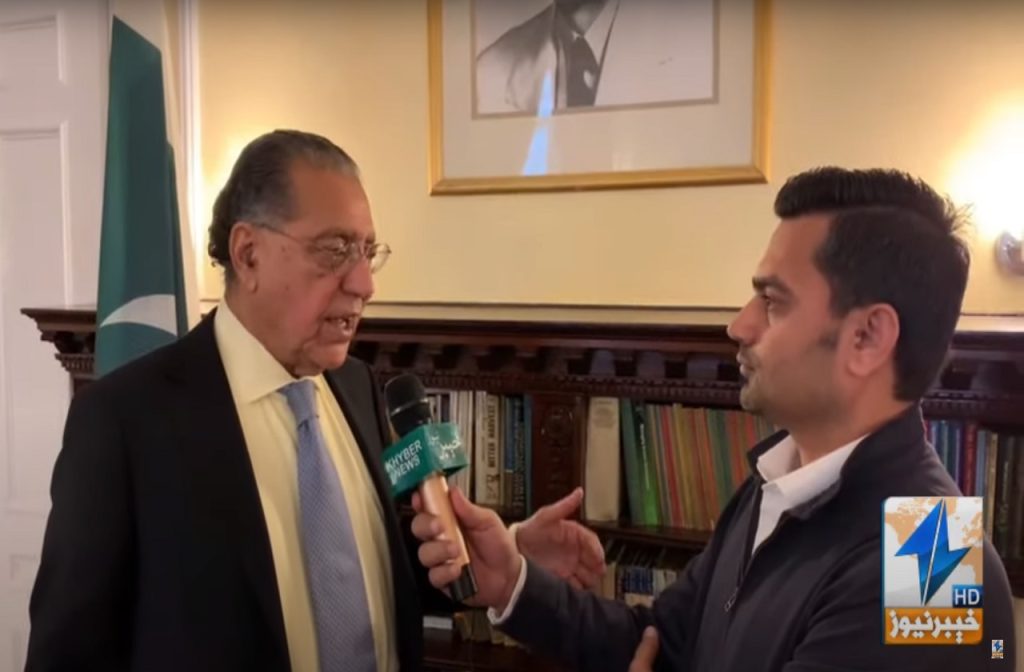In an exclusive interview with Khyber News, Pakistan’s Permanent Representative to the United Nations, Munir Akram, provided valuable insights into the significant visit of Caretaker Prime Minister Anwaarul Haq Kakar to the United Nations General Assembly (UNGA) in New York. Akram detailed the importance of the annual congregation of world leaders, shedding light on the diplomatic opportunities seized during this high-stakes week.
Diplomatic Significance of UNGA:
Akram underscored the gravity of the high-profile week during the UNGA, where leaders from across the world gathered to address global challenges and advocate for diplomatic solutions. He emphasized that the presence of Caretaker Prime Minister Kakar was instrumental in activating Pakistan’s diplomacy, allowing the nation to articulate its positions on various global issues.
Strategic Participation in High-Level Summits:
Munir Akram said that caretaker Prime Minister Anwarul Haq Kakar in his address delivered policy statement and raised the issue of Kashmir. During the UNGA, Caretaker PM Kakar participated in five high-level summits that included discussions on Sustainable Development Goals, Climate Action, and Pandemic Prevention. The representative highlighted the importance of Pakistan’s representation in these forums, indicating the country’s active engagement in addressing critical global and domestic challenges.
Additionally, Akram detailed the extensive bilateral meetings conducted by the Prime Minister, where important matters concerning Pakistan’s national interests were discussed. The Foreign Minister engaged in 12 ministerial-level meetings, further strengthening diplomatic ties and fostering cooperation on various fronts.
Engagement on Jammu and Kashmir:
The Contact Group on Jammu and Kashmir of the Organisation of Islamic Cooperation (OIC), held a meeting on the sidelines of the 78th session of the UN General Assembly, became a platform for Pakistan to present its stance on the longstanding Kashmir issue. Pakistan took the opportunity to present its stance on the Kashmir issue to the world, emphasizing the importance of resolving the longstanding matter in accordance with international norms.
Afghanistan’s Recognition:
Addressing the Afghanistan recognition issue, Akram clarified that Pakistan had decided to recognize the Taliban government in Kabul after consultations with neighboring and regional countries. For this, Pakistan formed a six neighbour members forum including Russia to build consensus on Afghanistan. However, this recognition doesn’t imply a lack of relations; Pakistan maintains diplomatic ties and has appointed an ambassador in Kabul.
Regarding Afghanistan’s recognition at the United Nations, it necessitates a majority decision through voting in the house to obtain membership. Without naming the ousted President Ashraf Ghani appointed Afghan ambassador to the UN, Ghulam Isaczai, Munir Akram expressed concern, stating that despite the disappearance of the entire government, he (Isaczai) remains in New York managing affairs. The source of his support and financing is unclear. Akram suggested that if the Taliban’s nominated representative is not permitted to represent the government, the seat should be left vacant.
UNGA on Climate Change Challenges in Pakistan:
Akram provided insights into Pakistan’s stance on climate change during the UNGA oral update , highlighting the country’s commitment to addressing environmental issues. He mentioned the UN resolution from the previous year and the broad international support received. Akram noted that UNDF, UNICEF, World Bank, Qatar, China, Saudi Arabia, and 50 other countries stood by Pakistan, showcasing a collaborative effort to address climate challenges. He said that the UN Secretary General pledged for more assistance to Pakistan to combat climate change challenges.
Pakistan and OIC Effort Against Islamophobia:
Touching upon the issue of Islamophobia, Akram discussed Pakistan’s engagement with the OIC and the recognition given to the Pakistan and IOC struggle to prevent Islamophobia. He said that United Nation by adopted a resolution, designated March 15 as a day of against Islamophobia. He also mentioned the Human Rights Council’s resolution in its resolution demanded to make such incidents illegal, with opposition from Europe and Western countries. Akram expressed optimism about Denmark’s legislative efforts, anticipating that Sweden might follow suit.
In conclusion, Munir Akram’s highlighted the strategic importance of Caretaker PM Kakar’s UNGA visit, showcasing Pakistan’s active and committed role in global diplomacy and addressing pressing domestic and international issues.


